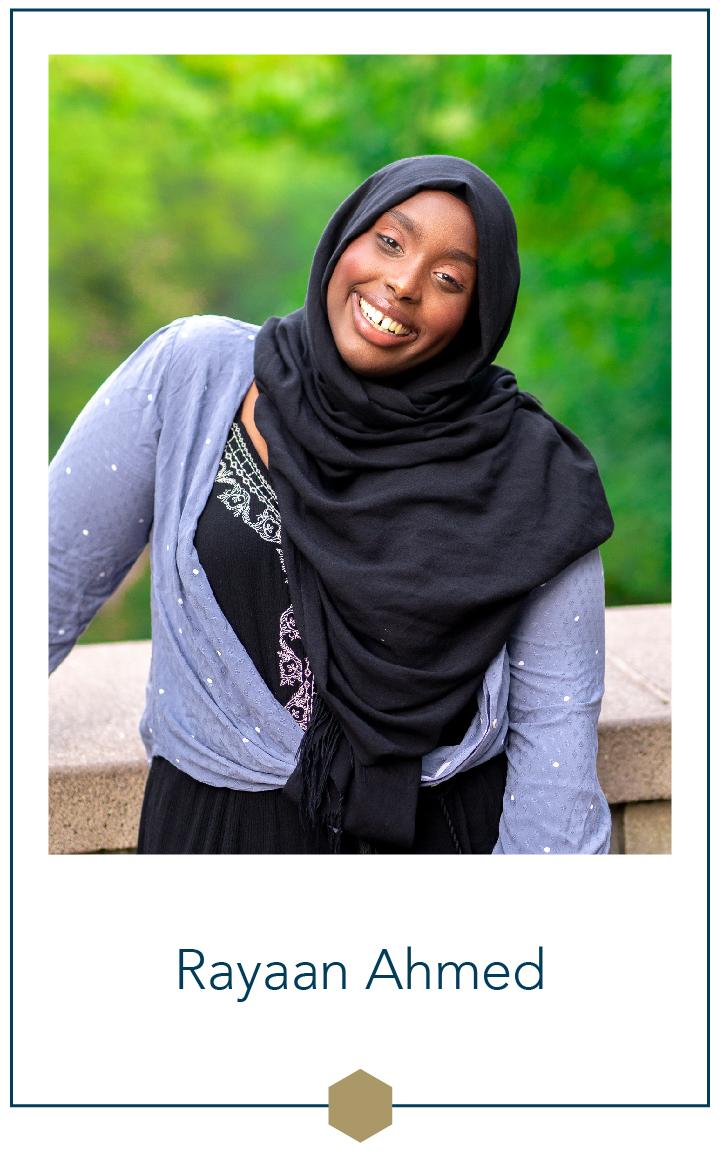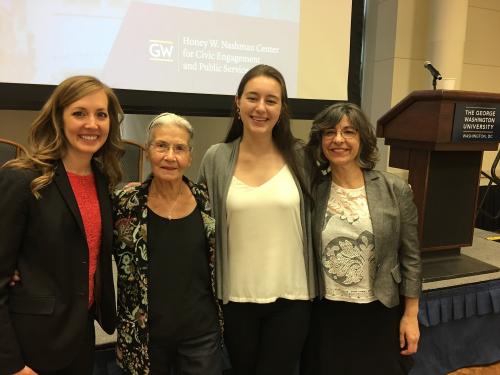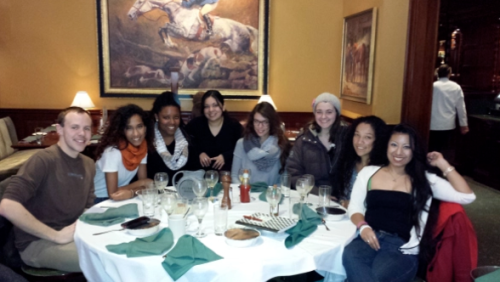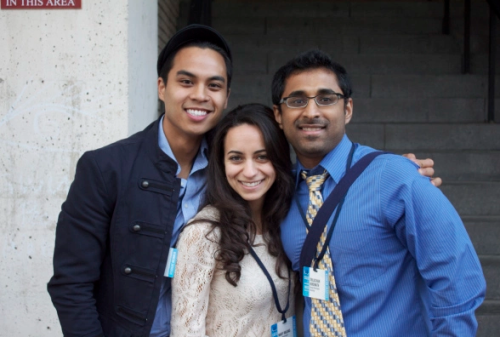Previous Knapp Fellows
Meet Our 2024-25 Knapp Fellows
Riley Lima

Project Title: School-based Asthma Telehealth (SAT) Intervention & Research Study
Faculty Advisor: Dr. Maranda Ward, MPH, EdD, Associate Professor
An Nguyen

Faculty Advisor: Leslie Davidson, PhD, OTR/L; School of Medicine and Health Sciences; Department of Clinical Research and Leadership
By collaborating with caregivers, medical interpreters, and occupational therapists, the project aims to enhance support for patients and caregivers with limited English proficiency. It will assess the potential of improving transitional care for dementia patients and their caregivers during hospital-to-home transitions. The project will explore leveraging new health technologies like telehealth to bridge research and implementation gaps, with the goal of adapting and evaluating the Home Environmental Skills-Building Program (ESP) in partnership with Cedars-Sinai.
Kristen Rodrigues

Faculty Advisor: Dr. Tamara Taggart, Ph.D., M.P.H., Associate Professor, School of Public Health, Prevention and Community Health
Transgender men (TM) face higher risks of late-stage cervical cancer (CC) due to low screening rates, often caused by barriers like lack of knowledge, non-affirming healthcare, gender dysphoria, and discrimination. To address this, she will create an online CC awareness campaign tailored to TM in the DMV area, ensuring it is culturally aligned and destigmatizing by centering their voices. She is partnering with Whitman-Walker and Community Expert Solutions to provide valuable expertise on TM health disparities and insights for sustainability.
2023-24
Blake Coleman
Blake Coleman is a senior in Public Health with a pre-medical concentration at the Milken Institute School of Public Health.
Project Title: Educational Enrichment: Promoting Academic Achievement Among Children Suffering from Homelessness in Washington, DC Post COVID-19
Project Description: The project is an educational enrichment program for young, primarily black children experiencing extreme poverty and homelessness in Washington, DC. The program met monthly and offered additional academic support to children, primarily in the subjects of math and reading. Due to online learning during COVID-19, many homeless children missed out on years of schooling and learning due to a lack of access to the internet or electronic devices.
Faculty Advisor: Karen A. McDonnell, Ph.D., Associate Professor, Department of Prevention and Community Health at Milken Institute School of Public Health at The George Washington University
Community Partner: Community of Hope
Jessica Hinshaw
Jessica Hinshaw is a doctoral student in the Human and Organizational Learning Ed.D. Program, Graduate School of Education and Human Development.
Project Title: Supporting Community Health Centers Build Climate Resilience
Project Description: Federally Qualified Health Centers (FQHCs, also known as community health centers) are uniquely positioned to address climate change challenges and build community resilience.
Unfortunately, both research and anecdotal reports from health centers show that they are unprepared and need more learning materials and learning/networking initiatives to address climate change.
To respond to these needs and desires, this community-engaged research project,
- Formws a Community Advisory Committee consisting of FQHC staff and community members
- Conductws qualitative case study research to identify and understand how FQHCs carry out climate change mitigation and resilience practices
- Created a compendium of resources and opportunities for FQHCs to dialogue, learn, and collaborate with one another on climate change issues
Faculty Advisor: Dr. Maria Cseh, Associate Professor, Human and Organizational Learning, Graduate School of Education and Human Development
Community Partners: The National Association of Community Health Centers and various local community health centers
Simone Sawyer
Simone Sawyer is a Social and Behavioral Sciences doctoral student at the Milken Institute School of Public Health.
Project Title: A Pilot to Increase Peer-to-Peer Mental Health Supports in DC Public High Schools: Utilizing a Method for Program Adaptation through Community Engagement (M-PACE) Framework
Project Description: This project aimed to increase access to youth peer mental health support for DC high school youth. The national youth mental health crisis is alarming, and DC high school students are feeling its impact. DC youth want and need support and also want to be part of finding solutions to this crisis.
Utilizing the M-PACE framework, this project worked with key stakeholders to identify an appropriate and feasible evidence-based peer-to-peer mental health curriculum and train 8 DC high school students at two schools in the evidence-based peer-to-peer mental health curriculum.
Faculty Advisor: Olga Acosta Price, Ph.D., Associate Professor in the Department of Prevention and Community Health, Milken Institute School of Public Health
Community Partner: The Young Women's Project, Our Minds Matter, Black Swan Academy
2022-23
Bailey Moore

Bailey Moore along with her faculty advisor for the project Dr. Maranda Ward (Knapp Fellowship Alumnus) from the GW School of Medicine and Health Sciences, worked with Black high school girls in select DC Public High Schools along with the community partner, Planned Parenthood of Metropolitan Washington DC (PPMW).
The intended benefit of the project was to address the difficulty many Black girls face when it comes to maintaining a positive/healthy self-image and sexual self-concept while recognizing factors that come with this difficulty and the stigma surrounding sexual health that has plagued the Black community for far too long. This was done through a lens of intersectionality and focused on positive youth development.
She collaborated with the staff for Sisters Informing Healing Living and Empowering (SIHLE) to create and facilitate the program while involving the youth to amplify their voices and develop the most informative and effective curriculum that fits with the mission of PPMW but also fits with the needs of the young ladies who will be involved in this program.
Publications
The book "Black Women's Reproductive Health and Sexuality: A Holistic Public Health Approach" was published by the American Public Health Association. Our chapter "An Approach to Applying an Intersectional Lens to Research on Black Women’s Reproductive and Sexual Health" analyzes Serrant's "Silences Framework" and how authors can apply it to future research methods related to Black women's reproductive and sexual health.
Jennifer Ko

Jennifer Ko and her faculty advisor for the project Dr. Sean Cleary, Professor of Epidemiology from the Milken School aimed to allow adults with developmental disabilities (DD) to participate in a 10-week health and wellness course and learn the basic principles of healthy activities that can be easily recalled and applied in their everyday lives.
Our Stomping Ground (OSG) was the community partner, a non-profit organization with a mission ‘To build inclusive communities and strengthen neighborhoods through diverse programming, sustainable, affordable housing, and social spaces for people of all abilities.
Grace Rafferty

Grace Rafferty and the faculty advisor for her project, Dr. Michelle Kelso from the Department of Sociology at the Columbian College of Arts & Sciences designed this project in collaboration with the Dunbar community, specifically aiming to work with high school students. It impacted the students, counselors, DCPS counseling office, and GWU community through the implementation of this project.
To pilot this program, Grace worked with Steve Rockey in the DCPS Counseling Office, Wendy Wagner in the Honey W. Nashman Center, Dr. Michelle Kelso of the Human Services & Social Justice Department, the counseling team at Dunbar High School led by 9th-grade counselor Emma Levine, and two student mentors Yemisola Animashaun and Asim Ebrahim.
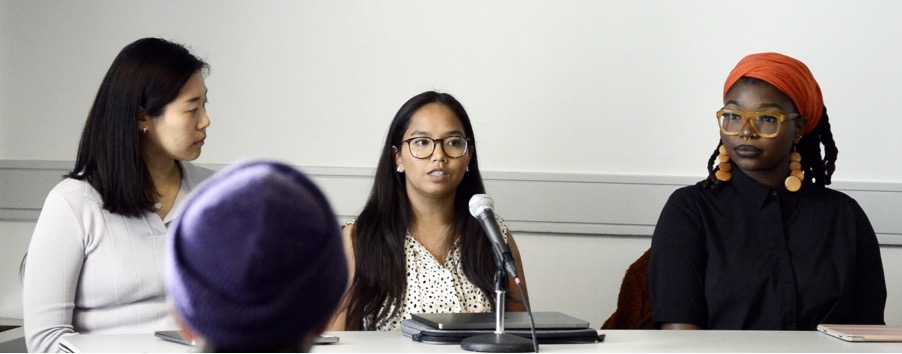
In April 2023, The Honey W. Nashman Center for Civic Engagement and Community Service was honored to showcase the impressive projects and achievements of the three selected Knapp Fellows, Jennifer Ko, Grace Rafferty and Bailey Moore.
LEARN MORE ABOUT THEIR PROJECTS
The event was attended by other students and hopeful applicants, faculty members, community partners, and Nashman staff. It featured presentations by the fellows about their experience with their fellowship, community engagement work, lessons learned, and reflections. There was a Q&A and reflections section, which saw some fantastic participation from the audience as well.
2021-22
2021-2022 Knapp Fellow recipient Rayaan Ahmed is created a bridge between the Lutheran Social Service (LSS) Imhotep Freedom School in Minnesota and the Al-Aqsa after school program, a similar school program in Mogadishu, Somalia. The Imhotep Freedom School built a year-round youth center dedicated to helping encourage young people to look beyond themselves to make a difference in their communities. Over the course of the her project, she worked with students in this center to deepen their understanding of how community service can fundamentally shape the future of their communities.
2021-2022 Knapp Fellow recipients Catherine O'Donnell, Elizabeth Mason, Perrin Krisko are all focusing on Global Health in the Milken School of Public Health. The project involves young community members in air quality monitoring activities in order to bring about locally-relevant community mapping of air pollution and sustainable reform to environmental determinants of health in Ward 1 of Washington D.C. For the upcoming year, they are interested in ways to increase the accessibility of air quality monitoring, with the hopes of making improvements to impact future generations.
2018-2019
2018-2019 Knapp Fellowship awards were given to Gillian Joseph for her project Find Our Women, which is an initiative focused on Missing and Murdered Indigenous Women in the US and Kristen McInerney for her project on Fostering resilience in Newly Arrived Immigrant Students.
2017-2018
2017-2018 Knapp Fellows Gayatri Malhotra & Chloe King presenting their research at the 2017 Nashman Symposium of Community Engaged Scholarship. Gayatri is working on gender sensitization in Indian schools & Chloe is working on food waste and environmental impact in DC Public Schools.
2016-2017
The 2016-2017 fellowship cycle was awarded to : Maranda C. Ward, a doctoral candidate at the Graduate School of Education and Human Development, who won for her project, “D.C. Youth Expression: Art, Community and Identity,” and School of Media and Public Affairs master’s student Zinhle Essamuah for “The Minority Vote” a film documentary following youth voters as the go to the polls in the primary elections.
2015-2016
The 2015-2016 fellowship cycle was awarded to : Mariam Adil, a Masters student in the Elliot School of International Affairs ’16, who is developing video games as learning tools for international development projects called “Stereo-Wipe” and Samantha Cook , a undergraduate in the Elliot School of International Affairs ’16, who won for her project “Digital Hope” a digital and marketing communications curriculum to help teach digital literacy skills to homeless populations so that they can have access to micro-work environments.
2014-2015
The 2014-2015 fellowship cycle was awarded to one project: Pop Art -Painting Out Poverty’s mission is to unite artists in a fight against poverty in DC neighborhoods.
Through sharing our painting, music, poetry, and other arts, we hope to collectively end disparities in the community . This team is being lead by Paulina Sosa a graduate student in the Milken Institute of Public Health ’16 and was announced on June 1, 2014.
2013-2014
The 2013-2014 fellowship cycle was awarded to two projects: Ascension GW a yogatherapy program to assist victims of sexual assault led by Emily Rasowsky , Ivonne G Ramirez, and Aly Azharand Mobile Medical Care a mobile primary care van that travel to wards that had limited to access to primary care facilities led by Ben Trevais, Mary Kaldas, and Tri Hiremath . These fellows were announced on April 27, 2013, at the Spring Service-Learning Symposium.
2012-2013
The 2012-2013 fellowship cycle was awarded to two projects: the Financial Literacy Program coordinated by Sofi Momen and Amir Abdallah and Waste Diversion DC by Manmeet Sandhu and Reshma Arrington. The fellows were announced on May 1st 2012, at the Spring Service-Learning Symposium.
2011-2012
The Knapp Fellowship for Entrepreneurial Service Learning was launched in 2011. The first fellow was Melissa Eddison, then a junior who launched a sustainability project with the goal of creating a GW co-op café.





